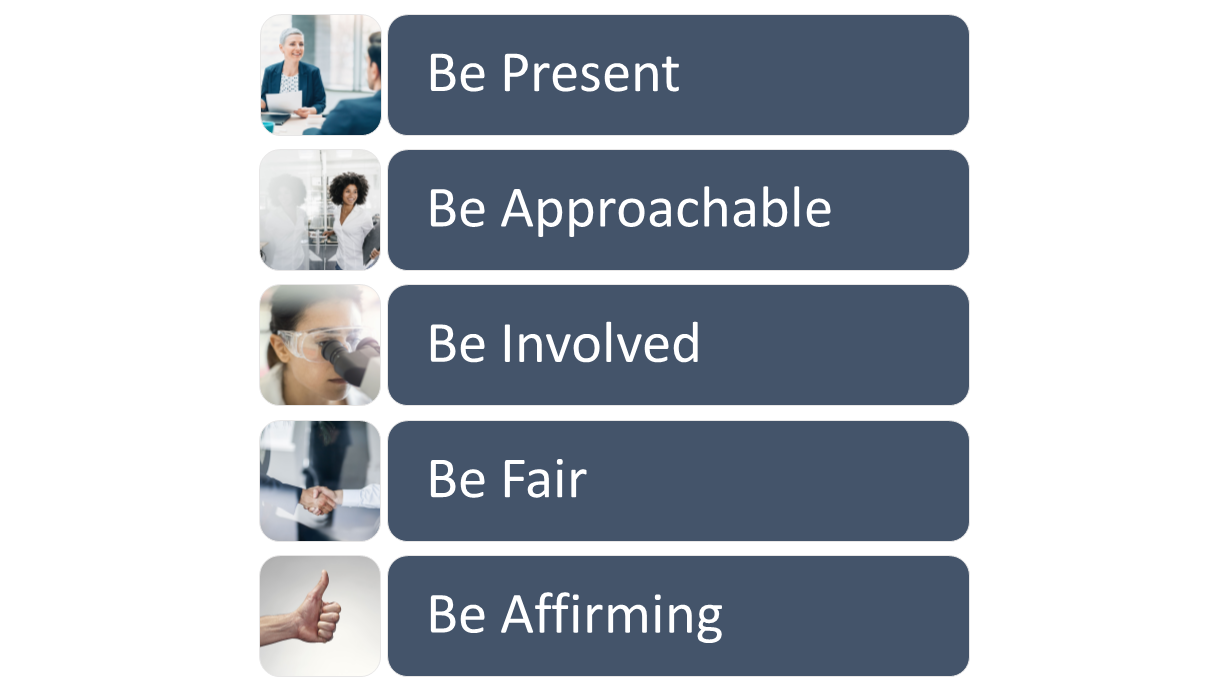In this article, we will look at 5 behaviors of a good coach and how these behaviors build meaningful relationships between you and your team. But before we do, I would like you to answer this question. Do you think of yourself as a coach? If so, Great! But if your answer is "No" or "I’ve never really thought about it", please stay with me as I present the value in having this perspective.
85% of employees feel that they are not given the amount of coaching needed to succeed in their job
Recent research shows that 85% of employees feel that they are not given the amount of coaching needed to succeed in their job and 69 % are unhappy, unengaged, and unmotivated. Both statistics result in a high turnover rate and poor employee performance which usually translates into poor team performance and morale.
These challenges are not new but grow increasingly more common. There are many contributing factors to these disturbing statistics, but in this article, we will discuss one of the highest contributing factors, feeling undervalued. We are all different and are motivated by different things but one thing we have in common is the need to be valued. This characteristic crosses all gender, age, and ethnicity lines.
The interest we take in the people we serve has a direct correlation to their job satisfaction and performance.
The basic need to be valued is often personified in the workplace because much of the workforce in America find their self-worth tied to a job. For some, it is hard to succeed and excel when they don’t feel like a valuable member of a team. The interest we take in the people we serve has a direct correlation to their job satisfaction and performance.
If you are in a supervisory role, your employees are in a very real sense, your “customers!” We should be very intentional about the service we offer and how satisfied they are.
If you are in a supervisory role, your employees are in a very real sense, your “customers!” We should be very intentional about the service we offer and how satisfied they are.
I may be a manager, but when I see myself as a coach it changes everything. Coaching my team to success means building a team that works well together, continually improves their skills, and strives for excellent performance. It’s not about managing people, but leading, coaching, and developing a team that knows they're valued and enjoy working together.
Be Present
Be Present – When an employee is speaking, give them your full attention and focus on what they are saying. Lean in and show interest. If they are complaining or have an issue show empathy. Listen, really listen and show interest.
Show respect as you would to a friend. We build value when we can ignore the distractions around us and focus only on the need of the one in view.
Don’t multitask and give them half of your attention. Avoid checking your cell phone or thinking about what you are going to say when they stop talking. Ask questions to confirm understanding and to avoid misunderstanding. Asking questions show’s that you’re interested. Show respect as you would to a friend. We build value when we can ignore the distractions around us and focus only on the need of the one in view.
Be Approachable
Be Approachable - An open-door policy sends the message, “I always have time for you because you are important!” You may be unavailable some of the time, but it should be the exception and not the rule. If it’s not a good time to engage, politely excuse yourself and let them know you are interested in talking to them and will get back to them as soon as possible. This doesn’t require an appointment, just remember to seek them out at your next available moment and continue the conversation. Jot down something about the conversation so you can pick up where you left off. Making people feel like they always must have an appointment to speak to you elevates your importance and sends the wrong message.
We are also more approachable when we are known to be open minded. We become unapproachable when we disregard the ideas and opinions of others. This can make us appear narrow, inflexible and uncaring. Also, the need to be right and to have everything done our way, can make others less likely to share ideas or make suggestions. These behaviors hinder building relationship. The best ideas for improvement usually come from our team, but if we’re not approachable we’ll never get to hear them.
This one habit will go a long way in building value in your team and developing mutual respect.
Be Involved
Be Involved - Inspect what your employees are doing. People respect what we inspect. How can you compliment and give affirmation for a good job done or coach someone if they are struggling, when you don’t know specifically what they are doing? Taking an interest in the details shows you who is working, who is slacking and who is frustrated because they need more direction or training. This is a morale builder for those who carry the bulk of the workload and will give you the opportunity to help the ones who are not performing. The point is to care about each person and how the work is being done not just about getting the work done.
Be Fair
Be Fair – Never show favoritism. There will be employees who excel, and recognition is in order, but be careful not to overlook the little things that get done by others and try not to over recognize the star players. Give team recognition whenever possible stressing that it took everyone to accomplish the goal. Sometimes we give more responsibility or tasks to those whom we know have the skills and aptitude to get it done instead of taking the time to coach those who may not be able to carry their share of the work load. This can cause hard feelings with both parties.
You will naturally have employees that you click with more than others. This is true, even in a family. The loud, jovial, funny person demands are attention just by the nature of their personality. We know a lot about them because they’re always talking. But the more quiet and reserved ones need us to initiate conversation and ask the questions that will tell us more about them and give more insight into who they are as an individual. It’s a good practice to avoid joking and small talk with the same people. Make sure that even in the, not so work-related conversation you interact in an impartial way. If you genuinely care about the success of your team, you will carefully avoid the personal relationships with that exclude the other team members. Staying personable yet professional is the best way to build trust and loyalty.
Be Affirming
Be Affirming - Thanking your team for the work they do and acknowledging their value to the company should be a weekly if not daily practice and is a good starting place for giving affirmation in the workplace, but a good coach is going to look for more specific ways to give Affirmation. Praise and appreciation should be as specific as possible to be received as genuine.
We affirm others by appreciating the work they do, the ideas they share and the uniqueness they bring to the team.
Here are two examples:
- Sam arrives a little early every morning to get the coffee started and sometimes brings in donuts. It's just something he does and it’s very thoughtful. You mention to him how you’ve noticed that he makes coffee for everyone in the morning and in your own words, let him know the value it brings to the team and how much you appreciate it. You also thank him in front of the team and specifically mention how you look forward to having a cup of coffee ready when you arrive in the morning. It would be very important to acknowledge Sam both in private and in front of the crew for his extra efforts. He makes the morning better for everyone.
- Ben is always noticing when things need to be organized or cleaned. He does it routinely without being asked. Again, you tell Ben that you appreciate the little extras he does to keep things clean and organized and the value it brings to the team. You also mention it to the group and stress how much you appreciate his contribution to the orderliness of the workplace.
Be helpful but don’t always try to fix everything. Build self confidence in your staff by believing in their ability to find the solutions to the problems that arise. Ask the questions that may lead them to solving the problem on their own. This confirms that you believe in them and trust their decisions. Creating this kind of culture builds relationship and promotes job satisfaction.
I hope this helps you to see yourself as the coach of your team and not just a manager of people. This has not been an exhaustive treatment of this subject by any means, but I hope this has been an encouraging read. I truly believe that effective coaching is the investment that will make your team golden!
Learn more about leadership >











